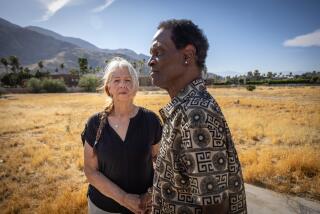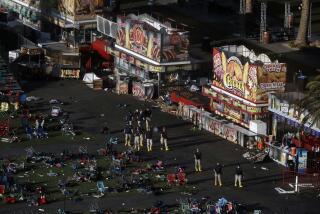‘We all almost died’: Survivors of Las Vegas sniper find support in each other
- Share via
For Erin Powell, it’s jackhammers. They sound like the rifle she heard that night.
For Jill Winter, it’s high-rise buildings. They remind her of the Mandalay Bay, where the gunman broke two windows on the 32nd floor to fire at the crowd.
For Mark Medford, it’s a face he sees in his sleep, of a woman shot in the head at the concert. He picked her up and carried her away from the carnage.
Five months after the Route 91 country music festival in Las Vegas turned into the largest mass shooting in U.S. history — 58 dead and more than 500 injured — much of the nation has moved on. But the 20,000 people who were there, including dozens from San Diego County, are still dealing with the after-effects.
A support group that meets weekly in Mission Valley is helping many of them move forward. It’s led by Shiva Ghaed, a licensed clinical psychologist who specializes in trauma and works at Naval Medical Center San Diego.
Her professional training and experience are important to the local Route 91 survivors, but so is this: She was at the concert herself, caught in the terror, dodging the bullets.
“We all almost died,” she said Monday night, when about 40 people gathered at In Cahoots, a dance hall and saloon that provides free space to the group because it is a country music place and because it’s closed to the public on Mondays.
They sat in chairs arranged in a large circle on the dance floor as the meeting opened. The lighting was low. Boxes of Kleenex were positioned nearby, just in case.
Several people hugged “Comfort Cubs,” teddy bears weighted to approximate the feel of a newborn baby. Originally created by an Encinitas woman for mothers who lose their babies in childbirth, the bears increasingly have been donated to people suffering from all kinds of trauma: hurricanes, floods, shootings.
Ghaed tells the group, “Don’t avoid.” Several heads nod in agreement. They’ve heard this before from her. She wants them to embrace their feelings and memories about what happened and learn how to process them, put them together in a way that is less scary.
Avoidance is always easier, she said, but it can cause problems later.
“You can’t jump inside your bucket,” she tells them. “If you start avoiding everything, you’ll lose all the things that are dear to you.”
You’ll be alive, she said, but not really.
Some group members are doing a project called “58 Random Acts of Kindness.” It’s a way to pull them out of their despair and pay forward their gratitude for having survived. One act of kindness for each person killed that night, Oct. 1, 2017.
Powell has completed 32 of hers. The 4S Ranch-area resident picked up the tab for a mother and daughter she saw dining at a restaurant. She bought a clerk at a golf course anything he wanted from the pro shop after she saw him calmly handling a customer’s rude, noisy complaints.
Helping others is healing, said Powell, who attended Route 91 with her husband, David. And she needed healing.
“We were all a mess,” she said.
In the first weeks after the shooting, the sound of jackhammers at a construction site or a helicopter flying overhead would send her to the ground in a fetal position, sobbing. She had nightmares.
She said coming to the weekly support group meetings has made a difference. Part of it is “being able to know that you are not the only one going through this,” she said. And part of it is the “Trauma 411” counseling Ghaed provides, in person and in writing with documents shared via Facebook and a website, route91therapy.com.
There are lessons called “Find New Meaning After Trauma” and “Why Avoidance Makes It Worse” and “Tips on Managing Nightmares.”
All of it’s free. Ghaed said when she came back from Las Vegas, grateful to be alive (four people standing next to her were killed), she knew because of her professional training and experience that the survivors would need help coping with what they’d seen and heard.
“I felt a sense of panic, that there would be thousands and thousands of people with these invisible wounds,” she said. “I know how insidious PTSD can be.”
She put out the word through the local media that she was forming a group. Forty-two people showed up for the first meeting. She estimates about 200 different people have attended at least once, with most sessions drawing between 40 and 60.
Now survivors in other cities are reaching out to her, too. She’s been to Las Vegas a couple of times to help a group get started there. Just last week she received an email from someone in Chicago.
“People are resilient,” she said, “if you give them the tools.”
At Monday’s support meeting, the members broke into smaller groups to share how they were feeling. The Parkland school shooting in Florida has triggered difficult emotions for some of them. Panic attacks. Tears. Unexpected outbursts at friends and relatives.
Lisa Como told a story about Thanksgiving. The El Cajon resident was happy to be surrounded by family for the holiday, but not so thrilled when an argument broke out about the dinner rolls.
“I got shot at!” she yelled. “I don’t care about the rolls!”
Awkward silence ensued.
That was a reminder to her that healing doesn’t happen in a straight line. There are good days and bad days.
A good day was a recent excursion group members made to a “Paint and Sip” studio in Escondido. The owner gave a free session to the survivors. They painted pictures of American flags and drank wine. “We had fun,” Como said.
Another “exposure activity” is planned for July to a Padres game. For some, it will be their first time at a large, public event since Route 91.
“Some people are just treading water out there,” Ghaed said.
And some people aren’t. Medford and his wife, Shannon, went to country music concerts before the shooting, and they’ve gone to them since. “It’s really helpful in feeling normal again,” the Lakeside resident said.
But he doesn’t think he’ll ever move beyond remembering the face of the woman he tried to help in Las Vegas. She’d been shot in the head. He carried her to a police car and put her in the backseat. He doesn’t know for sure, but he believes she was among the fatalities.
Until about a month ago, he refused to remove his concert wristband from that night. Then he replaced it with a large tattoo on one forearm. It has a cross, and the words “country strong,” and the number 58. And underneath it all, one word: “Survivor.”
At the end of Monday’s support group, he and the others gathered in the middle of the dance floor at In Cahoots. They squeezed close together, like a football huddle, and if they looked like a team, that’s because they are.
In unison, on the count of three, they shouted the two words that bind them, now and for as long as they need it: “Route 91!”
More to Read
Sign up for Essential California
The most important California stories and recommendations in your inbox every morning.
You may occasionally receive promotional content from the Los Angeles Times.










